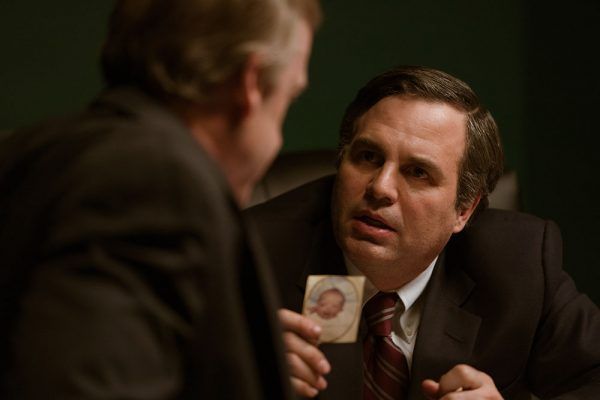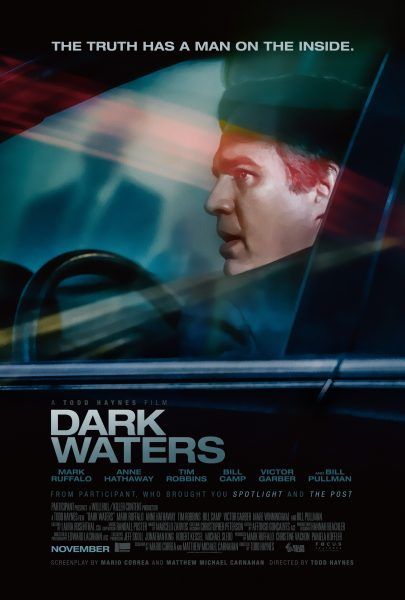The most frustrating aspect of Todd Haynes’ drama Dark Waters isn’t that the story is unimportant. On the contrary, it’s incredibly important. What makes it so damn depressing is that we’ve seen it again and again. We saw it with A Civil Action. We saw it with Erin Brockovich. There’s no shortage of movies based on a true story of powerful companies poisoning citizens and the legal system being too slow and too overwhelmed to effectively combat such behavior. So here is Dark Waters with this story again as it recounts how corporate defense attorney Robert Bilott (Mark Ruffalo) took on DuPont Chemical, which was poisoning the entire world. It goes about as you’d expect, with all the attendant clichés of the beleaguered spouse and shadowy figures. Dark Waters makes good points, but it doesn’t answer how many more times we’ll have to see this point be made.
The story begins in 1998 when corporate attorney Robert Billott has just made partner at his law firm when farmer Wilbur Tennant (Bill Camp) comes into Billott’s office and demands that Billott look at what’s happening to Tennant’s cattle. Billott reluctantly agrees because Tennant is friends with Billott’s grandmother, but when he sees the evidence with his own eyes, he begins to slowly move into an investigation of DuPont, which has a waste facility near Tennant’s farm. This investigation leads to the startling revelation that DuPont isn’t just poisoning poor Wilbur’s cattle, but has been poisoning the entire world as they used their power to self-regulate to ignore the harmful effects of their chemicals. Billott then begins a Sisyphean feat of trying to hold DuPont accountable for their actions.
Once Haynes starts recounting Billott’s case year-by-year, you have a pretty good indicator that this isn’t a case that will be settled easily, and even if the year markers didn’t tip you off, you probably live in a capitalist society, so you know how this is going to go. Thinking back on Dark Waters, I was reminded of The Big Short, another movie about how unregulated industries destroy the lives of average Americans, except that director Adam McKay knew he had to entertain his audience because people don’t want to be lectured to even if they agree with the merits of the case. I assume, “Corporations shouldn’t poison people,” is a pretty popular statement, but does anyone want to see a movie that makes that point for 127 minutes? Do you need to?
At best, Dark Waters plays out like a horror film in slow motion. There’s nothing supernatural about the terror here, and its banality only makes the events more terrifying. This is the system technically working like it should, but it shows the system obliterates lives and communities in exchange for corporate profits. It can’t all come down to the Robert Billott’s of the worlds who have the expertise and the resources just to be a David against a DuPont’s Goliath. We have a system that does not work, not even necessarily because of brazen corruption, but because capitalism itself, if left unchecked, will destroy everything. You can see it in every scene where the citizens of West Virginia are angry at Billott or Tennant because DuPont employs most of the town. People will risk drinking poison if it means they can hold onto their jobs. That’s insane and yet it’s so common you can already see future Dark Waters ahead.
In 5-15 years from now, we’ll probably get a big drama about the opioid crisis. It will go through the same motions with a crusading lawyer and/or victim who discovers that the opioid companies always knew their drugs were dangerous and addictive but had the power to push them on the American public anyway. We’ll probably get a movie about Flint, Michigan and how much they’ve suffered since their water gave the entire town lead poisoning. And on and on it goes to where these kinds of movies almost feel oddly exploitative because yeah, it’s dramatic, but what kind of awareness are you really raising when this kind of story keeps getting told?
At some point, you need to go deeper or find a new approach, and sadly, Haynes does neither. It doesn’t make Dark Waters a bad movie, but a frustratingly redundant one. We’ve seen this story of the good-hearted everyman taking on the system and getting crushed under its wheels. You’ve got Anne Hathaway playing the thankless role of Concerned Wife who has no existence outside of what her husband does. You’ve got a scene where Billott thinks he’s being followed in a parking lot even though there’s no indication that DuPont kills people, especially when it has the money to just bury them in the legal system. From a director like Haynes who has shown ways to cleverly upend genre with movies like Far From Heaven and I’m Not Here, Dark Waters feels anonymous and rote; a gray slog through a system we know is broken and no one knows how to fix.
Rating: C



